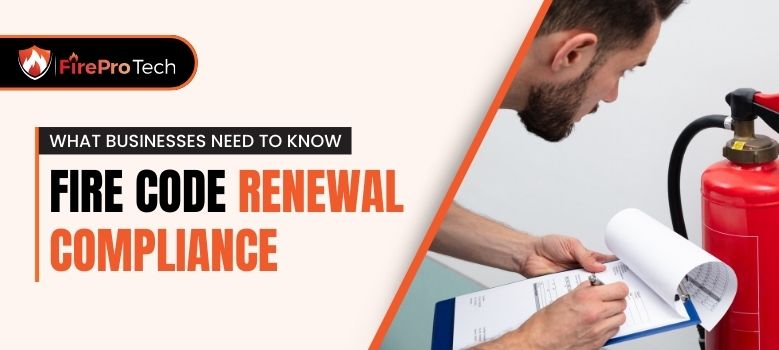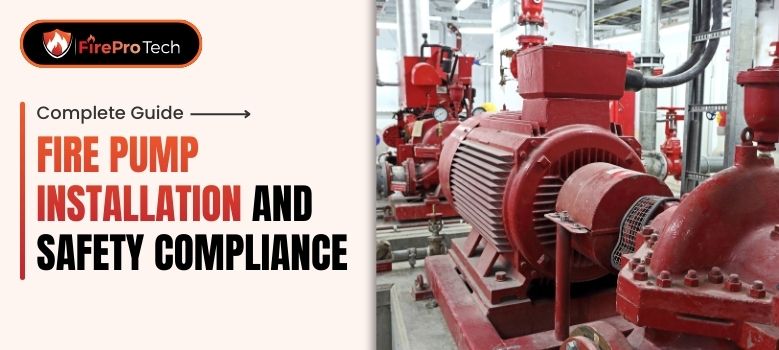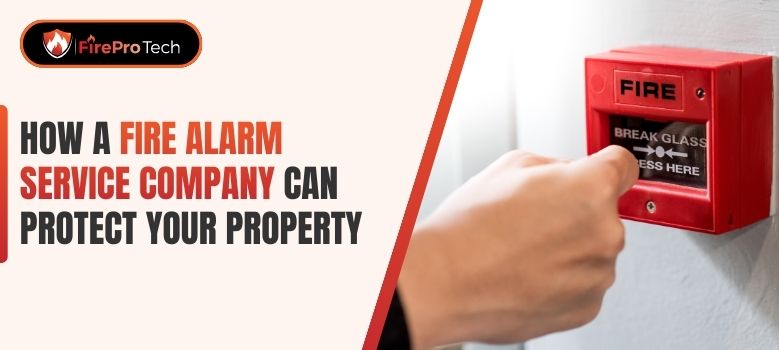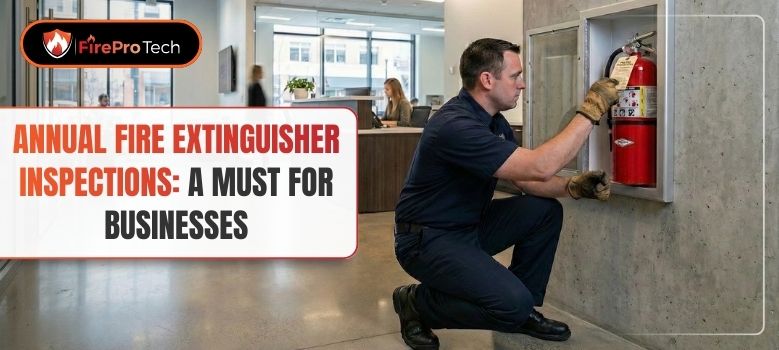
Fire code renewal compliance is one of the most critical responsibilities for business owners, property managers, and facility directors. Every commercial building must meet specific standards to ensure that fire protection systems remain functional, tested, and legally recognized. Renewal is not a one-time event but an ongoing process designed to safeguard people, property, and operations from the devastating effects of fire.
When handled properly, fire code renewal compliance not only prevents fines and penalties but also builds confidence among employees, customers, and regulators that the facility is prepared for emergencies. Yet, many businesses overlook the importance of timely renewals, assuming their original approval or past inspections are enough. The truth is, fire codes evolve, equipment ages, and systems require ongoing care to remain effective.
Understanding how renewal works, why it matters, and what steps are involved empowers building owners to stay ahead of potential risks. This guide explores the essentials of compliance, the roles of business owners and contractors, and how organizations like FirePro Tech, LLC support facilities in achieving consistent, reliable, and hassle-free compliance.
Initial approval is the first milestone a new building or business must achieve before opening its doors. It confirms that all fire protection systems—sprinklers, alarms, suppression systems, pumps, and emergency lighting—were installed according to code and are operational. Renewal, however, is the ongoing process of proving that these systems are still functioning and have been inspected, tested, and maintained as required by law.
Fire code renewal compliance is the certification that these protections remain in place, documented, and up to date. Without renewal, even a previously approved building can quickly fall into non-compliance, exposing its owners to violations and its occupants to unnecessary danger.
Renewal cycles are not arbitrary—they are set to ensure that fire code renewal compliance keeps fire protection systems in step with changes in the environment, occupancy, and wear over time. Equipment such as sprinklers or alarm panels can degrade, batteries in emergency lighting can fail, and suppression systems may lose effectiveness if not tested. Renewal requirements ensure these issues are identified and corrected before they create hazards.
For businesses, adhering to renewal cycles is more than checking a regulatory box. It demonstrates a commitment to safety, continuity, and accountability. In the event of an emergency, up-to-date compliance can even influence liability outcomes and insurance claims, highlighting just how critical renewals are to risk management.
The ultimate purpose of fire code renewal compliance is protection. Every inspection cycle verifies that life-saving systems are ready to activate when needed. Reliable sprinklers can contain a fire in minutes, suppression systems in kitchens or special hazard areas can prevent catastrophic losses, and alarms ensure that people evacuate quickly.
From an operational perspective, compliance also reduces business disruptions. Non-compliance penalties, surprise shutdowns from the fire marshal, or delayed occupancy permits can all cost a business far more than the investment required to maintain systems properly. Renewal compliance is, therefore, both a safety necessity and a financial safeguard for any organization.
Protect your business—renew fire code compliance!
Fire code renewal compliance is ultimately a shared responsibility, but the legal obligation rests with the building owner. The renewal process demands clear communication between the property owner, licensed contractors, and the local fire marshal’s office. Each role has defined expectations, and neglecting them can lead to violations, costly fines, or even forced closures.
The building owner is the primary party accountable for ensuring fire code renewal compliance deadlines are met. Owners must schedule inspections, maintain records, and complete repairs or system upgrades before renewal deadlines. Even if management duties are delegated to a facility director or property manager, the owner remains legally responsible for the final outcome.
Owners are also required to keep documentation organized and ready for submission. This includes inspection reports, deficiency correction records, and certifications proving that all fire systems meet the latest code requirements. Without these, renewal cannot be approved.
A licensed fire protection contractor is essential to achieving fire code renewal compliance. Fire systems cannot be inspected or maintained by unqualified personnel. Licensed contractors test and maintain alarms, sprinklers, suppression systems, standpipes, fire pumps, and emergency lighting, ensuring each system functions as intended.
These contractors also provide the official reports and compliance documentation required during renewal. In many cases, they act as the direct liaison between the building owner and the fire marshal’s office, ensuring deficiencies are corrected before deadlines.
The fire marshal’s office enforces fire code renewal compliance. They issue notices reminding building owners of upcoming deadlines and verify that deficiencies are corrected on time. A 30-day notice is typically issued when inspections or repairs are due, and a past-due notice follows if issues remain unresolved.
Working proactively with the fire marshal helps owners avoid penalties. Cooperation demonstrates accountability and often makes the renewal process smoother, as compliance officers recognize the effort put into maintaining a safe facility.
Secure your premises—renew fire code compliance now!!
Renewal is more than a formality. During fire code renewal compliance checks, authorities review fire protection systems, maintenance records, and repair documentation to ensure everything meets regulatory standards. Understanding what inspectors prioritize can help owners prepare in advance and avoid delays.
The renewal process begins with a thorough inspection of fire protection systems. This includes fire alarms, sprinklers, standpipes, fire pumps, suppression systems, emergency lighting, and any special hazard systems. Each must be fully operational and free of deficiencies that could compromise safety. Even a single malfunctioning device can jeopardize the renewal process.
Inspectors do not only examine the physical systems; they also review the records that prove fire code renewal compliance inspections and maintenance have been completed on schedule. Tags on extinguishers, sprinkler systems, and alarms must be current. Test reports must show that ITM (inspection, testing, and maintenance) was carried out by a licensed contractor. Missing or outdated records are one of the most common causes of non-compliance.
Authorities frequently encounter recurring issues during fire code renewal compliance reviews. Expired tags on extinguishers, malfunctioning emergency lighting, blocked sprinkler heads, and outdated alarm panels are among the most common. Failure to address these before renewal deadlines results in delayed approval and potential fines.
Another frequent obstacle arises when businesses undergo tenant improvements or occupancy changes without updating their fire protection systems. Modifications such as adding new walls, equipment, or storage can affect sprinkler coverage or alarm placement, requiring reconfiguration to meet current codes.
By anticipating these potential issues and addressing them in advance, business owners ensure a smoother process and demonstrate their commitment to maintaining fire code renewal compliance year-round.
Read Also: Fire Safety Code Consulting Services: Protect Your Business
Fire code renewal compliance is enforced through structured notices and strict timelines. Building owners cannot afford to ignore these, as failure to act quickly often results in steep financial penalties or operational disruptions. Understanding how the notice system works is the first step toward staying compliant and avoiding unnecessary risks.
The fire marshal’s office typically begins the fire code renewal compliance process by issuing a 30-day notice when inspections, testing, or deficiency repairs are approaching their due date. This notice serves as a reminder to building owners that deadlines are near and action is required. The 30-day period provides enough time to coordinate with a licensed fire protection contractor, schedule inspections, and complete any necessary repairs.
Proactive owners treat this notice as an opportunity to get ahead of compliance rather than waiting until the final days. By responding early, they can avoid backlogs in contractor scheduling and prevent overlooked deficiencies from becoming major violations.
If a building owner fails to resolve deficiencies or misses scheduled inspections, a past-due non-compliance notice is issued. This document signifies that the facility is officially out of fire code renewal compliance, and corrective action must be taken immediately. At this stage, the fire marshal may increase oversight, require re-inspections, or apply financial penalties until the property is brought back into compliance.
Ignoring a past-due notice is extremely risky. In addition to fines, authorities may restrict occupancy or shut down operations until all violations are corrected and verified.
The consequences of missed deadlines extend beyond fines. Insurance providers may reduce or deny coverage for properties that are not compliant. In the event of a fire, liability risks escalate if it is discovered that required systems were not maintained properly. Operationally, a delay in renewal approval can stall business permits, lease agreements, and tenant improvements.
For these reasons, businesses should treat notices with urgency. Consistent preparation ensures fire code renewal compliance is achieved on time and without disruption to daily operations.
Inspection, testing, and maintenance form the foundation of fire code renewal compliance. These requirements exist to confirm that fire protection systems remain functional long after initial installation. A successful renewal depends on proving that ITM has been performed properly and documented by a licensed contractor.
Different systems have unique inspection timelines that support fire code renewal compliance. Fire alarms often require monthly and annual checks, sprinklers are inspected quarterly and annually, and emergency lighting needs regular testing to confirm battery reliability. Suppression systems, standpipes, and fire pumps each carry specific schedules as well.
Adhering to these frequencies demonstrates that the facility is actively monitored between renewal cycles. Skipping or delaying inspections can quickly put a property at risk of non-compliance.
Because each system operates on a different cycle, planning is critical to fire code renewal compliance. Building owners who wait until renewal deadlines approach often find themselves overwhelmed by multiple overdue tasks. Instead, spreading inspections and maintenance throughout the year keeps systems balanced and prevents backlogs.
Coordinating ITM across alarms, sprinklers, pumps, and suppression systems also reduces operational disruptions. Contractors can schedule grouped inspections and perform multiple system checks during the same visit, minimizing downtime for businesses.
When deficiencies are found during inspections, repair workflows begin. Parts may need to be ordered, systems taken offline, and retesting scheduled after repairs are complete. These steps often take longer than expected, making it essential to address issues as soon as they arise.
Final approval for fire code renewal compliance cannot be granted until all deficiencies are resolved and documented. Keeping a clear repair workflow ensures nothing slips through the cracks, and retesting confirms that corrections have restored full system functionality.
Thorough recordkeeping is just as important as physical inspections for fire code renewal compliance. Documentation should include test results, repair completion reports, and updated system tags. Records should be organized in a way that makes them immediately accessible to the fire marshal during renewal reviews.
Whether stored digitally or in physical binders, consistent documentation demonstrates accountability and readiness. Businesses that maintain accurate ITM records often experience faster renewals, fewer disputes, and stronger confidence from regulatory authorities.
Fire code renewal compliance is best achieved with a clear timeline and actionable steps. Waiting until the last minute often results in missed deadlines, incomplete repairs, and stressful interactions with the fire marshal. By following a structured timeline, building owners can stay in control of the process and avoid the penalties that come with non-compliance.
The process begins at least two months before the fire code renewal compliance deadline. During this period, building owners should schedule inspections with a licensed fire protection contractor. Early preparation ensures that any deficiencies discovered can be addressed without rushing or risking availability delays.
This stage is also the ideal time to gather existing records, review system tags, and verify that maintenance has been documented throughout the year. Identifying missing paperwork early prevents last-minute scrambles when the fire marshal requests verification.
Once inspections and repairs are complete, the focus shifts to final checks for fire code renewal compliance. Contractors should confirm that systems are fully functional, updated tags are in place, and documentation is ready for submission. Business owners should use this window to double-check renewal notices, confirm deadlines, and ensure all deficiencies have been resolved.
During this period, internal walk-throughs can help identify minor issues such as blocked sprinkler heads, obstructed exits, or expired extinguisher tags. Addressing these details ensures a smoother review during the official inspection.
On the renewal date, all required documentation and compliance reports must be accessible for the fire marshal. Having organized records and current inspection reports demonstrates accountability and streamlines the approval process.
After renewal is granted, businesses should immediately set reminders for upcoming ITM schedules and renewal deadlines. Treating compliance as an ongoing cycle rather than a one-time event ensures that fire code renewal compliance is always maintained without unnecessary stress.
A major factor in successful fire code renewal compliance is the quality and accessibility of documentation. Even if all systems are inspected and fully functional, missing or poorly organized records can delay approval. A comprehensive documentation package ensures that every requirement is covered, reducing the chances of disputes or repeat inspections.
Building owners are responsible for maintaining baseline documentation. This includes as-built drawings, device lists, occupancy details, and historical inspection certificates. Records of impairments, maintenance logs, and past deficiency reports should also be part of the package. These documents provide a complete overview of the building’s fire protection history and its compliance journey.
Licensed fire protection contractors play a key role in the fire code renewal compliance documentation package. They supply inspection reports, deficiency correction records, and completion affidavits for all systems. Having vendor records readily available shows that the building owner has engaged qualified professionals and that systems are being tested according to regulations.
While many businesses still rely on binders and paper logs, digital documentation is increasingly becoming the standard. Storing records electronically allows for quick retrieval, easier updates, and backup in case physical copies are lost. Digital platforms also make it possible to share reports directly with the fire marshal, cutting down on delays during the review process.
The way documents are labeled and organized can make or break the renewal process. Simple, consistent naming conventions—such as including dates, system names, and contractor details—make it easy to locate specific records when requested. Whether digital or physical, all records should be stored in a central location that can be accessed quickly by both the owner and the fire marshal.
By maintaining a renewal-ready documentation package year-round, building owners not only simplify the approval process but also show a proactive commitment to safety. Organized records are proof that fire code renewal compliance is being treated with the seriousness it deserves.
Fire code renewal compliance can be delayed when preventable issues are overlooked. Many businesses encounter the same recurring obstacles year after year, leading to unnecessary costs and interruptions. By anticipating these challenges, owners can stay ahead of problems and keep the renewal process on track.
Blocked exits and improperly stored materials are among the most common violations. Hallways cluttered with equipment or exit doors locked from the inside can immediately place a building out of compliance. Storage that obstructs sprinklers or alarm pull stations also creates safety hazards that delay renewal approvals. Regular walkthroughs and strict internal policies on egress help prevent these issues before inspections.
Systems taken offline for repairs or upgrades often remain impaired longer than expected. For example, a disabled fire pump or disconnected suppression system may not be restored in time for the renewal deadline. Neglecting these systems creates significant risks and prevents compliance approval. Consistent monitoring of repairs and scheduling re-tests immediately after restoration is essential to maintaining fire code renewal compliance.
Tenant improvements, equipment relocations, and occupancy changes often alter fire protection requirements. Adding walls, machinery, or hazardous storage areas can reduce sprinkler coverage or require alarm system modifications. If these changes are not addressed, the building fails to meet current codes. Proactive coordination with contractors ensures that system updates align with new layouts and operations.
Re-inspections cost both time and money. They often occur when deficiencies are only partially corrected or when documentation is incomplete. To avoid these setbacks, building owners should verify that every item identified in an inspection report has been addressed, tested, and recorded before requesting final approval. Thorough preparation significantly reduces the risk of delays in the renewal process.
Achieving fire code renewal compliance is not solely about systems and paperwork; it also depends on the people inside the building. Employees, managers, and contractors all contribute to maintaining a safe environment. Training and culture play a vital role in ensuring compliance is not just achieved at renewal time but sustained throughout the year.
Employees are often the first line of defense when it comes to spotting deficiencies. Proper training helps staff recognize blocked exits, malfunctioning extinguishers, or improperly stored materials. By reporting issues early, staff contribute directly to smoother renewal processes and safer workplaces.
Regular evacuation drills are required in many facilities and serve as proof of ongoing fire code renewal compliance. Drills not only train staff to respond quickly in emergencies but also provide valuable documentation to support renewal efforts. Records showing the frequency and success of drills demonstrate an active culture of safety, which strengthens a facility’s standing during inspections.
Designating roles within the organization ensures that compliance is a shared responsibility. A facility director or safety officer may oversee documentation, while department managers monitor daily housekeeping practices. Clear internal accountability prevents small issues from escalating into major violations that delay renewal.
By building a culture of awareness, businesses ensure that fire code renewal compliance is sustained beyond inspections and becomes part of everyday operations.
Partnering with an experienced contractor is one of the most effective ways to simplify fire code renewal compliance. FirePro Tech, LLC provides comprehensive support that helps building owners stay prepared, resolve deficiencies, and avoid stressful last-minute complications.
FirePro Tech, LLC coordinates inspection, testing, and maintenance schedules to ensure all systems are reviewed on time. By planning ITM proactively, businesses avoid missed deadlines and reduce the likelihood of receiving non-compliance notices. This forward-looking approach keeps renewal cycles smooth and predictable.
Rather than working with multiple vendors, FirePro Tech, LLC offers complete service for alarms, sprinklers, suppression systems, standpipes, pumps, special hazards, and emergency lighting as part of fire code renewal compliance. Managing all systems under one provider reduces confusion, consolidates records, and streamlines communication with the fire marshal.
To prevent delays, FirePro Tech, LLC prepares renewal-ready documentation packages. Checklists and audits are conducted in advance to verify that inspection reports, deficiency corrections, and certifications are complete. This ensures that every requirement is addressed before the renewal date, making approvals faster and easier.
FirePro Tech, LLC also acts as a professional liaison between building owners and the fire marshal’s office. By addressing questions, clarifying reports, and presenting organized documentation, the company reduces the administrative burden on owners and ensures compliance reviews proceed without unnecessary obstacles.
With these services, FirePro Tech, LLC transforms fire code renewal compliance from a stressful obligation into a structured, reliable process that protects both businesses and their people.
When handled reactively, renewal can feel overwhelming, with last-minute inspections, unexpected deficiencies, and stressful communications with the fire marshal. When managed proactively, however, compliance becomes a smooth and predictable process that strengthens both safety and business continuity.
FirePro Tech, LLC provides the expertise, planning, and full-service support needed to simplify renewal. By managing inspections, resolving deficiencies, preparing documentation, and serving as a liaison with authorities, the company ensures that every building owner can approach fire code renewal compliance with confidence and consistency. For businesses committed to safety and operational excellence, proactive compliance is not just required—it is essential.
The frequency of inspections depends on the systems in place and the type of occupancy. Fire alarms, sprinklers, suppression systems, standpipes, pumps, and emergency lighting each follow unique testing schedules set by code requirements. For most businesses, inspections occur on a monthly, quarterly, and annual basis to ensure consistent performance. Keeping these schedules up to date is critical for passing renewal reviews. FirePro Tech, LLC assists owners by coordinating inspections and providing complete documentation that supports fire code renewal compliance.
A fire safety certificate is the official documentation that confirms a facility meets current code requirements and has completed required inspections and testing. In most cases, certificates are valid for one year, after which the renewal process begins again. The validity period ensures that fire protection systems are reviewed regularly and remain reliable over time. FirePro Tech, LLC helps businesses maintain validity by managing ongoing inspections and preparing facilities for timely renewals.
Renewal requires a comprehensive documentation package that includes inspection reports, deficiency correction records, testing certificates, and updated system tags. Owners must also provide records of impairments, maintenance logs, and any modifications to fire protection systems. Without these documents, approval may be delayed or denied. FirePro Tech, LLC supports business owners by preparing renewal-ready documentation packages that simplify compliance reviews and reduce the risk of repeat inspections.
The legal responsibility for compliance rests with the building owner, even if management duties are delegated to others. Owners must ensure that licensed fire protection contractors inspect, test, and maintain fire systems as required. While property managers and facility directors often oversee day-to-day tasks, the owner remains accountable for renewal approval. FirePro Tech, LLC works directly with owners and managers to ensure that fire code renewal compliance is achieved smoothly and consistently.
Preparation begins with ensuring that all systems are functional and that inspection, testing, and maintenance records are complete. Walk-throughs should be conducted to check for blocked exits, obstructed sprinklers, or expired tags. Having organized documentation available for the inspector also speeds up the process. FirePro Tech, LLC assists businesses by providing pre-inspection audits, deficiency corrections, and checklists that make inspections more efficient and stress-free.
Failing an inspection usually results in a deficiency report that lists the issues requiring correction. In some cases, the fire marshal may issue a 30-day notice for repairs. If deficiencies remain unresolved, a past-due non-compliance notice may follow, leading to fines or restrictions on occupancy. Businesses can avoid repeated failures by working with professionals who manage repairs promptly. FirePro Tech, LLC ensures deficiencies are addressed quickly and retested so that fire code renewal compliance is restored without delay.
In many cases, businesses may continue operating while minor violations are being corrected, provided there are no imminent safety hazards. However, serious deficiencies such as impaired fire pumps, disconnected alarms, or blocked exits may require temporary restrictions or shutdowns until corrections are made. To minimize operational disruption, FirePro Tech, LLC offers rapid response services that correct violations efficiently, helping businesses maintain operations while achieving full fire code renewal compliance.

Fire pump installation is essential to effective fire protection in Houston, providing the water pressure...

Every property owner recognizes that safety, especially fire safety, is a top priority. Fires can...

Fire safety remains a top concern for businesses in Houston and its neighboring areas, especially...